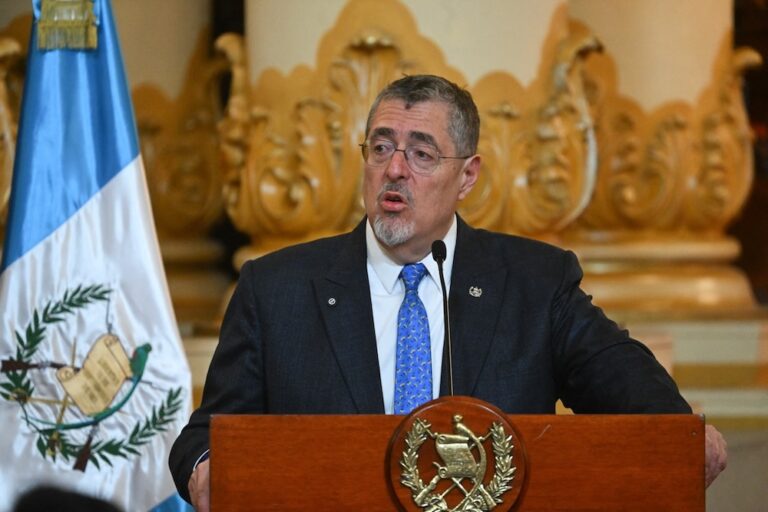(ARTICLE 19/IFEX) – In a 23 September 1998 letter to Guatemalan President Álvaro Arzú, ARTICLE 19 expressed concern that the guarantee of freedom of expression in the Guatemalan Constitution may not be applicable to ordinary individuals. Article 35 of the Guatemalan Constitution guarantees freedom of expression, but it restricts the guarantee to “medios de difusion,” […]
(ARTICLE 19/IFEX) – In a 23 September 1998 letter to Guatemalan President
Álvaro Arzú, ARTICLE 19 expressed concern that the guarantee of freedom of
expression in the Guatemalan Constitution may not be applicable to ordinary
individuals.
Article 35 of the Guatemalan Constitution guarantees freedom of expression,
but it restricts the guarantee to “medios de difusion,” [“media”] unlike
many articles which apply to “toda persona” [“every individual.”] On 10 July
1998, in a case involving Bruce Harris, Executive Director of Casa Alianza,
the 10th Appeals Court held that the constitutional guarantee of freedom of
expression does not apply to ordinary individuals as it is restricted in
scope to the mass media and journalists.
Harris was charged with defamation under Article 164 of the Penal Code for
alleging at a press conference that Susana Umaña was using her influence to
promote illegal adoptions. He has argued as part of his defence that he
should be covered by the guarantee of freedom of expression at Article 35 of
the Constitution. This claim was rejected by both the tribunal and Court of
Appeal and is now on appeal before the Constitutional Court. If he wins, his
case will be transfered from the Tribunal of Criminal Sentencing to another
body and he will benefit from a jury trial.
The right to freedom of expression as guaranteed under international law is
clearly applicable to all individuals, not just the media. Article 13 of the
Inter-American Convention on Human Rights (IACHR), for example, states:
“Everyone has the right to freedom of thought and expression.” Article 19 of
the International Covenant on Civil and Political Rights (ICCPR), also
protects every individual. Both of these treaties have been ratified by
Guatemala and are hence legally binding. Article 46 of the Guatemalan
Constitution, which provides that international human rights treaties take
precedence over internal law, provides some protection for freedom of
expression. International law, however, is not an adequate substitute for
constitutional protection of human rights. In this regard, both the IACHR
and the ICCPR require States Parties to adopt such measures as may be
necessary to give full effect to the rights they proclaim.
Recommended Action
Send appeals to authorities:
Constitution guarantees freedom of expression to all individuals or only to
the media
pursuant to Article 278 of the Constitution to amend this provision to bring
it more clearly in line with international standards
Appeals To
S.E. Alvaro Arzú
President
Palacio Nacional
Guatemala City, Guatemala
Fax: + 502 2 537472/519702/347364/515667/214537


